In this article, I’ll reveal some of the key things you can do to help you continue playing guitar with arthritis! You don’t need to give up playing the guitar, no matter how bad your arthritic symptoms are.
Keep on reading to learn about ideas you can try to make things easier and bring enjoyment back into your playing.
You can use the table of contents below to take you to the area that interests you. Click on the little box to open it and then click on the section of the article you want to read, or you can read from start to finish if you want the full educational experience!
If you are in a hurry and want to go directly to my tips to help you play better, click HERE.
What Is Arthritis? – Quick And Easy!


Here is the simplified version to help you understand what you might be dealing with. Arthritis is essentially the inflammation of one or more joints, which can cause tenderness and restriction of movement.
Arthritis can result from things like chronic repetitive motion, the aging process (osteoarthritis), crystal deposition (gout), infections, and autoimmune inflammatory (rheumatoid) conditions. This is by no means a complete list, but you get the basic idea.
It can happen in any joint but when it affects the joints of our hands it can put significant limitations on the things we enjoy doing.
Can You Still Play Guitar With Arthritis?

Absolutely! But it could take a little ingenuity, or you might require a little assistance, depending on the severity of your condition.
For more info, see Learning Guitar For Seniors – Make Each Day Great With Music
Even if you are a beginning player with no knowledge or playing experience, you can get started on the guitar, despite your hand problems.
One of the best things to help the discomfort of osteoarthritis is hand movement.
My mother was an amazing woman who could do anything, and her favorite saying was, “where there’s a will, there’s a way!”
Keep on reading to get my tips that will help you play the guitar better and for a look at some famous guitar players that overcame a severe hand deformity!
Famous Players With Hand Deformities
Here are three famous guitar players that overcame their hand deformities to play the guitar and become some of the very best guitarists of their genre. If they can do it, then so can you!
Les Paul

Les Paul was the Leonard Da Vinci of the recording world and a smoking hot guitar player.
Most people know him as the inventor of the guitar that bears his name. Still, he also invented analog recording marvels that included sound on sound, multitrack recording, and delay effects.
His inventions revolutionized the way we make records, even today!
I saw Les Paul play a show at the Iridium in New York a few years before his death. Both his hands had bad arthritic deformities. He showed me the guitar pick he made so that he wouldn’t keep dropping it (more about guitar picks later).
The show was nothing short of amazing. Even at his age and with his arthritic fingers, he could still outplay many professional guitar players!
Django Reinhardt
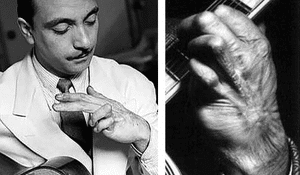
Django Reinhardt was a Belgian jazz guitarist and composer. He was generally considered the best player of his genre in Europe.
Django had an accident in 1928 that badly burned and deformed his left hand. After his recovery, he could only use his first two fingers!
While other musicians were convinced that he would never play again, Django developed a completely new left-hand playing technique and formed the famous “Quintette du Hot Club de France,” with violinist Stéphane Grappelli.
Django was the undisputed hottest player of Gypsy Jazz of his day! He had a great admiration for Les Paul and vice-versa.
Tony Iommi

Tony Iommi is an English guitar player generally recognized as the “Godfather Of Heavy Metal.”
He played guitar in a rock and blues band and quit his daytime job as a sheet metal factory worker to go professional.
On the last day at the factory, Tony had a horrible accident while operating a sheet metal chopping machine. He cut off the tips of his middle and ring fingers of his fretting (right) hand!
Tony was convinced that he would never play the guitar again, but his boss brought him a recording of Django Reinhardt with an explanation of his hand deformity.
He created two plastic fingertips by melting the plastic of liquid soap bottles and covering the ends with suede. Tony experimented with thinner gauge strings and tuned down 1/2 to 1 whole step to make them easier to play and bend.
Shortening guitar chords to include only the root and fifth, which could be played with just two or three fingers, Tony invented a new playing style, using what is commonly known today as “power chords.”
His disability gave rise to a new “darker” sound, and Black Sabbath is commonly credited as the first Heavy Metal band.
His work has influenced generations of metal guitar players.
Tips To Help You Play Better

Here are some of the most important things you can do to make it easier to play the guitar with the arthritis of your hands and fingers.
Everybody’s situation is different, so you’ll have to pick what can help you the most. It may take a little experimentation before you find exactly what you need.
Choose The Right Guitar

Choosing the right guitar is vital. A guitar that is difficult for you to play will not serve you well, even if you really like its sound. The easiest guitars to play are usually solid body electrics. They have thinner necks, lower action (the height from the top of the frets to the bottom of the strings), and more adjustments to make them easier to play.
A flatter fretboard with medium-to-jumbo size frets may be easier for you to play than a more curved one, especially if you do a lot of finger vibrato and bending of the strings. Guitars with high action and thick gauge strings will be difficult for your fingers to push down onto the frets firmly enough for the notes to ring out clearly.
Electric guitars specifically designed to play rock and heavy metal usually have the flattest fingerboards with a radius of 12 to 15 inches (the higher the number, the flatter).
Just because you have a heavy metal guitar doesn’t mean you can’t play country or classical music. Remember, the name of the game here is to be flexible!
Examples Of Guitars That Can Help
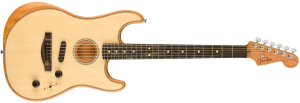
Ibanez makes some very easy-to-play electric guitars at reasonable prices (like the Gio GRX70QA, which has a thin neck and a 12-inch fretboard). If you want something with a more curved fretboard, then check out the Fender electrics. Fender fretboards are usually 7.5 inches (very curved) to 9.5 inches (still curved but easier to bend strings).
If you want an acoustic instrument, make sure it has low action and thin gauge strings. Check out the Fender Acoustasonic series. They are hybrid acoustic guitars that play more like electrics, but they’ll run you more cash.
The best approach is to go to a large guitar store, like Guitar Center, and try a variety of guitars until you find one that feels right. Remember, you can have them put lighter strings on the instrument and set it up to play easily.
You may be able to negotiate a free guitar setup into the instrument’s price.
Play On Light Gauge Strings
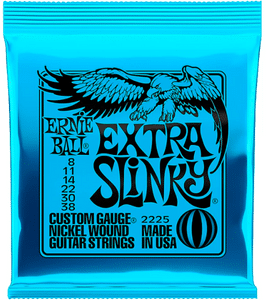
Playing on light gauge strings is one of the best things you can do to ease the discomfort of the arthritic symptoms in your hands while you play and afterward.
For more info, see Fingertips Hurt Playing Guitar? – How To Stop The Pain!
Even the lightest gauge strings for an acoustic guitar will be much heavier than a light gauge string set for an electric instrument.
For example, the high E string (10) in an Ernie Ball Earthwood Extra Light set is almost as thick as the B string (11) in an Ernie Ball Extra Slinky string set.
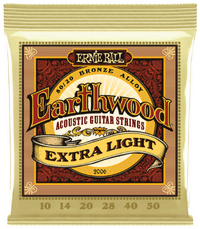
That’s why you should try an electric guitar, even if you are an acoustic player.
Changing the gauge of your strings may change the relief (degree of straightness) on your guitar neck.
Going from a heavy string gauge to a lighter one can cause a “back bow” in the neck, which needs to be corrected by loosening the neck’s truss rod.
Never attempt to adjust the truss rod if you don’t know the proper procedure, or you could permanently damage the neck.
For more info, see Guitar String Gauge Guide – Finding Your New Sound!
Use A Pick That You Can Hold
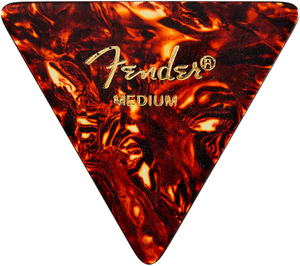
If you have trouble holding on to your guitar pick, you can either find a pick that you don’t drop or learn to pluck the strings with your fingers.
Usually, a larger pick will be easier to hold onto. Fender makes a “355” triangular-shaped pick that has three usable points and is very big. I used one of these in high school to look “cool.” It was very easy to keep from dropping, even when playing fast passages.
Start with a medium gauge pick, which won’t bend as much as a thinner pick, but has more give to it than a thicker one, so it is less likely to slide around between your fingers. Ultimately you should try all pick shapes and thicknesses to find what works best.
The other thing you can do is modify a guitar pick to your own custom specifications or make the surface rougher so it won’t slide around. Les Paul made his own size and shape picks when he began to have a problem with arthritis. He even glued sandpaper to the surface.
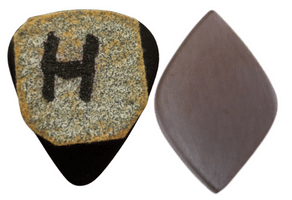
By Les Paul
Another option is to put something on your pick to make it stick to your fingers. “Gorilla Snot” (no kidding!) is available for just such a purpose.
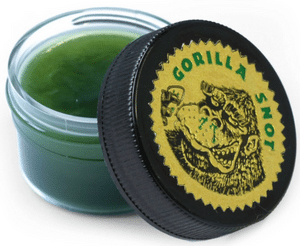
My drummer used it to keep from accidentally flinging his sticks, and it works great on picks too.
You can always get creative and make your own sticky goop!
Pick With Your Fingers
Just because you played with a guitar pick your whole life, it’s not a death sentence if you can’t hold one any longer. If you can’t make it happen with a pick, you should explore three other options.
Remember, you need to be flexible and think outside the proverbial guitar case to get back on track with your playing! Anything can be done, so just get on with it.
- Play with only your thumb and fingers (no pick), like a classical or flamingo guitarist would
- Use a pick on your thumb (a “thumb pick”) and your bare fingers, “country-style,” or “hybrid picking”
- Play with a thumb pick and picks (“finger picks”) on all your fingers, also popular in some country music styles
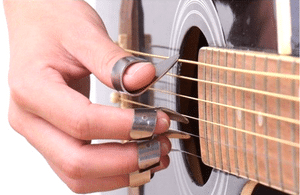
If you play rock or any other style of loud music with power chords and lightning-fast runs, would it surprise you to learn that Jeff Beck does not use a pick? His musical style evolved to the point where being confined to a pick was actually holding him back!
Adjust Your Playing Position And Posture
Playing position and posture can make all the difference, especially with guitarists that have arthritis!
Proper playing posture will help you minimize the pain in your wrists, hands, and fingers. Find a comfortable playing posture, which will be different when you play sitting versus standing. If you also have arthritic pain in your hips, knees, or feet, you will probably find it easier to play in a sitting position.
Consider using a footrest when sitting and find a comfortable chair. If you play sitting on the couch, try to sit like you are playing in a chair.
When playing in a standing position, the width and length of your guitar strap can be crucial. Try to avoid heavy guitars, like a Les Paul, but if you love them, you should use a wider strap to minimize shoulder and back pain. Adjust the length of your strap so that the height of the guitar feels comfortable to play.
For more info, see How To Stay Motivated To Learn Guitar – Top Tips For Success.
Find The Best Time To Play

If you play the guitar long enough, you will notice that there is a “golden hour” when you seem to be at your creative best or have the least amount of distractions. For me, it’s the first thing in the morning when everyone else is sleeping.
With arthritis, it’s a bit different. Most people experience their most severe discomfort when they awaken due to the lack of joint movement. Depending on the type of arthritis you have and the severity of your disease, it may take you anywhere from 15 or 20 minutes to 1 or 2 hours to get your hands moving at their best.
So find your own golden hour and make the best of it. Try to plan the rest of your day or night around it, especially if you’re retired. Believe me, it helps!
Rearrange Your Playing Material
Another essential thing to understand is that what you play can be as important as how you play it and what instrument you play it on. So, what am I talking about now?
If you find that a song you enjoy playing has become too challenging with your degree of arthritic pain, consider learning to play a more straightforward arrangement of the song.
Try substituting guitar chords with simpler ones. For example, a C7th chord can be substituted with C. Melodies that occur in multiple or upper neck positions can be played where they feel most comfortable for your wrists, hands, and fingers.
Advanced guitarists who play chord melody (both the harmony and melody of the song at once) can simplify by splitting things up.
Many song arrangements are written for less advanced players that can be learned quickly. You can use these or write your own. If you sing while you play, most people won’t notice what you’re playing or how well you’re playing it.
The point is that you can still have fun with your playing and bring joy to others simultaneously!
For more info, see Best Guitar TAB Sites – What No One Is Talking About!
Talk To Your Doctor

If you haven’t already done so, I recommend making an appointment to talk to your doctor about your arthritis to see if anything can be done medically to help your symptoms.
Explain your problem, how it affects your ability to continue playing the guitar, and how much music means to you.
Other things can be done if you’re not a medication person, like physical or occupational therapy. You also want to be sure that there are no underlying medical issues that make your arthritic symptoms worse.
Ask your doctor if things like acupuncture, chiropractic, herbal, or stress-relaxation therapy can help your situation.
Join A Support Group
Some people find that participating in an arthritis support group is beneficial. Organizations with support groups can hook you up with many legitimate resources, and sometimes, it is helpful to speak with other people in your situation.
The Arthritis Foundation is an excellent resource. Also, please have a look at their Living With Arthritis blog.
Keep On Reading For More Helpful Information!
How Do Musicians Deal With Arthritis?

Musicians can be more prone to developing arthritis due to the repetitive motions involved in playing an instrument, especially if you play or have played professionally.
Ask a dozen different musicians how they deal with their arthritic symptoms, and you will probably get twelve different answers. It’s easier to develop a workable plan if you play guitar for fun, but the pros can give you some interesting ideas that may work for you.
In addition to the material discussed above, musicians tend to find creative ways to cope with their symptoms. Most musical hobbyists won’t play on their “off days.” Try to find a happy medium between having to play every day and not playing at all. Remember to take frequent breaks.
Some guitarists who make their living playing with a band try to arrange to have another guitar player sit in on their behalf when they are experiencing a severe arthritis flareup. Other players carry heat and ice packs or topical “joint rubs” with them to use between sets.
Can Playing An Instrument Cause Arthritis?
There is no published scientific evidence that playing an instrument can cause arthritis. Still, chronic overuse of hand and finger joints may bring on the symptoms of arthritis earlier or worsen them.
Garden variety, or “osteoarthritis,” is a fact of life that comes with aging. Some musicians claim that playing music helps their symptoms.
Don’t make the prospect of getting arthritis a factor in your decision to begin or continue playing an instrument. Life is too short not to enjoy all the healthy and enjoyable activities it has to offer!
Keep Doing What You Love!

The fact that you are reading this article means that you are wondering if you can learn to play the guitar with arthritis in your hands or you are looking for ways to keep on playing.
Either way, good for you! I salute your desire to take or keep control of your life by making the guitar part of it!
With all the musical and medical resources available today, the solution to dealing with your arthritic pain is only limited by your imagination.
If you love playing the guitar, then keep on doing it. It’s as simple as that when it comes right down to it! Remember, “where there’s a will, there’s a way!”
Don’t Let Others Discourage You From Doing What You Enjoy!

The world is filled with people who had not made their dreams come true because they let others discourage them or quit when they were closer than they realized to achieving their goals!
To deal with your arthritis, it’s essential to surround yourself with others that believe in your ability. Stay away from naysayers, doubters, and people filled with negative energy.
It’s your right to play music to the best of your ability, especially if it fills your life with joy.
Beware Of Other Medical Problems That Can Be Confused With Arthritis

Although you have pain in your joints, it’s important to be aware that other medical problems can cause these symptoms, such as bursitis, fibromyalgia, Lyme disease, or even more severe conditions.
It’s essential to ensure you have the correct diagnosis since many illnesses are curable or need to be treated differently from arthritis.
So be sure to get a proper evaluation by your doctor or other healthcare professional.
Key Takeaways

Here are some of the key points you should remember after reading this article.
- You can still play guitar with arthritis, no matter how severe!
- Many players with hand disabilities overcame them
- Getting the right guitar for you can make all the difference
- Never give up because “where’s there’s a will, there’s a way”
- Talk to your doctor to get all the options available for diagnosing and treating your condition
Further Reading
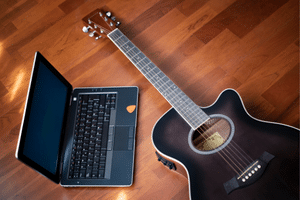
Here are the references I gave you to other articles on my website, plus some additional ones, all in one spot. To learn more, just click on the titles below.
- Guitar String Gauge Guide – Finding Your New Sound!
- Fingertips Hurt Playing Guitar? – How To Stop The Pain!
- Why Learn To Play The Guitar? – Read This Before You Decide!
- Learning Guitar For Seniors – Make Each Day Great With Music
- How To Stay Motivated To Learn Guitar – Top Tips For Success
- Best Guitar TAB Sites – What No One Is Talking About!
- Arthritis Foundation
- Living With Arthritis
Are You Qualified To Make Guitar Adjustments Or Modifications?
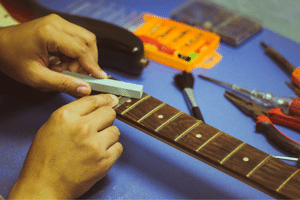
It’s great to work on your guitars, especially if you have a lot of them, but you should always be aware of your limitations.
Adjusting things like an electric guitar’s string height (action) or pickup height can be straightforward. Still, some adjustments require the proper training and experience, like adjusting a guitar’s truss rod.
When you doubt your ability to adjust, repair, or modify your guitar, it’s always best to bring it to a competent guitar technician or luthier (guitar designer & builder). You can permanently damage your guitar, and it might never play and sound right again!
Making modifications to your guitar can void its manufacturer’s warranty and cause permanent damage to the instrument. Certain modifications are irreversible, so you may be stuck with them, even if you desperately want to restore the guitar to its original condition!
I learned that the hard way over the years until I did a three-year apprenticeship in a guitar repair shop. Now I have my own home workshop with the proper training and equipment to safely maintain and repair all my instruments.
Remember: “When In Doubt, Send It Out!”
Frequently Asked Questions

Here are some of the questions that often come up about arthritis for guitar players.
If you have any questions that are not addressed in this article, please ask me in the comment section, and I will get right back to you.
What’s The Difference Between Osteoarthritis And Rheumatoid Arthritis?
Osteoarthritis comes from wearing out joints as you age and with repetitive motion. Rheumatoid arthritis is an inflammatory condition of the joints that can be related to autoimmune disease and other medical conditions. Always check with your doctor if you think you have arthritis.
What Is The Most Painful Form Of Arthritis?
Gout is usually the most painful form of arthritis, although other forms of inflammatory arthritis can be very painful too.
How Do You Prevent Arthritis When Playing Guitar?
It may be difficult to prevent getting arthritis or making it worse if you play guitar professionally. Some of the things you can do are make sure you have the right guitar for you and stop playing temporarily if you have joint pain.
How Do I Stop My Hands From Hurting When Playing Guitar?
Choosing the right guitar and guitar strings will help. If you are a beginner, then remember not to overdo it when you are practicing, especially if you have not developed calluses on your fingertips. Never try to play through pain!
Does Playing Guitar Make Your Fingers Longer?
Absolutely not! There is no way to make your fingers longer by playing the guitar or other instrument. As you continue to play, your fingers will begin to stretch apart farther so that you can play chords and scales more comfortably.
How Can I Strengthen My Arthritic Hands?
Physical therapy can help. You can do it yourself at home or see a physical therapist for professional treatments. If you use a handgrip device, be careful not to overdo it and stop immediately if it hurts your joints.
Can You Get Tendonitis From Playing Guitar?
Yes, tendonitis is one of the most common guitar-related injuries. Do not play through tendinitis pain and check with your doctor for the proper treatment.
Do Guitarists Get Carpal Tunnel?
Yes, carpal tunnel syndrome is a common problem for guitar players. If you think you are having the symptoms of carpal tunnel, make an appointment with your doctor to confirm the diagnosis and get the best treatment options.
Does Arthritis Go Away?
No, although the joint damage from arthritis does not go away, the symptoms of arthritis can be effectively treated to make them go away or be tolerable so that you can play the guitar comfortably.
Final Thoughts

I hope you found this article on playing guitar with arthritis helpful! Millions of people around the world play guitar with arthritis of the hands.
You need to find the combination of things that will control your symptoms to the point where you can enjoy making music on your instrument.
Having a positive attitude will help make all the difference. Don’t be reluctant to get help if you need it. See your doctor for a medical evaluation and look for support from the family members and friends you can depend on.
Avoid people who have a negative attitude or discourage you from playing the guitar.
There are many local or online arthritis support groups where you can get help.

Tell Me What You Think

Please leave a comment below if you enjoyed this article, have any questions about playing guitar with arthritis, or want to give your point of view. I will be happy to help you.
- What things have you tried to play guitar with arthritis? What has helped you the most?
- What guitar, strings, and pick do you use? Are they helping your arthritis symptoms?
- Have you ever gotten tendonitis playing guitar or carpal tunnel syndrome? How did you treat it?
- Has this article given you the confidence to learn to play guitar or continue playing guitar with arthritis?



A great article and something I have never thought of before. We all take for granted the use of our hands with work and hobbies and your article will be very beneficial to those who are struggling to keep up with playing a guitar due to this condition.
My brother plays, I own a guitar but never learnt how to play properly, although i love its sound. I like the fact you have covered so much including which picks to use, types of guitars and the strings too. Great to know guitar lovers don’t have to feel restricted.
I’m curious…. Can playing for so many years cause arthritis ?
I’ll be sharing this with my brother who loves to play.
Louise
Hi. Lousie
Thank You for your comments!
Unfortunately, there are a lot of guitar players with bad arthritis, so I hope this article will make things easier for them. There’s always a way to get something done if you want it badly enough.
It sounds like it’s time for you to pick up your guitar and have another go at it! Maybe your brother can give your some lessons. I appreciate you sharing the article with him!
There’s no published scientific evidence that playing the guitar can cause arthritis, but repetitive motion can make arthritic symptoms worse over the years. It’s essential to use proper body mechanics when playing, especially for professional guitarists!
Frank
Arthritis is a crippling disease so I know how hard it must be for someone with this problem to be able to continue playing the guitar since you need finger and hand coordination.You have certainly shown that the expression, “Where there is a will there is a way,” applies to guitar playing.Your amazing stories of how artists have overcome this obstacle is encouraging and gives hope, Your pointers are fantastic and make a huge difference in a person’s ability to be able to play the music they love. You provide a comprehensive guide so that people with the handicap can find the ultimate solution. As everyone is different you have encouraged people to be adaptable and to choose the suggestions that make a difference individually for each person. Wow, I love your site!
Hi, Toplink
Thank You for your comments and kind words about my website!
It’s tough to give up the things you love most when you have arthritis in your hands or anywhere else! I sincerely hope this article will go a long way to helping guitar players continue to create music or pick up their guitar once again!
Frank
Thank you for this article, Frank. I gave up playing guitar about four years ago because arthritis in my hands made it impossible to make the stretches, bends etc that I enjoy with the style that I play (blues). But I miss playing and decided on a whim this morning to search “playing guitar with arthritis”. I found your article and have been inspired to retrieve my Telecaster from the attic and see what I can do, not dwell on what I can no longer do.
Hi, Jay
Thank You for your comments!
I’m thrilled beyond words that my article prompted you to begin playing your guitar again! An attic is no place for such a fine instrument!
I hope by now that you have been reunited with your Tele and are enjoying playing it to the full extent of what is physically possible. If you can have fun playing even the simplest things, then mission accomplished!
Have you thought about lowering your guitar’s string height (action) and using a lighter gauge string set, which will help quite a bit with string bends? Did you know that Billy Gibbons uses a string set with a 0.007 high-E? He always gets such a fabulous sound! That string set is commercially available from Dunlop (Dunlop RWN0738 Rev. Willy’s Lottery Brand Electric Guitar Strings – .007-.038 Super Fine).
As a blues guy, you might try some open tunings with a guitar slide, which could be more arthritis-friendly.
I can tell you that with arthritis, you have to keep those finger joints moving, so guitar playing could also be physically therapeutic!
Please let me know how you make out and if you have any questions or if there is anything I can do to help!
Keep On Rockin’ The Blues! ?
Frank ?
Hello Frank. My guardian Angel have directed me to your write up. I thought once arthritis hits a guitarist was just the end. But quite the opposite. I have been trying to learn the guitar lately. A few years ago I took classical guitar lessons, and as usual it got in the way of my life being a Professional Photographer at the time. Two medical problems hit me recently. The first one I was diagnose with Dupuytren’s contracture on my right hand ring finer. The surgery was not successful and to make it worse COVID-19 hit the world. Recently my left hand Pinky finger is showing Dupuytren’s contracture. This past year I was diagnosed with Lumber Scoliosis, it is manageable. I was surprised to read that there are many famous and excellent guitarists that suffer with arthritis and have managed to overcome some of their problems, including their pain management. Reading your article there’s always some hope for those like myself who want to fight back and learn to play the guitar. Your suggestion of the electric guitar is quite interesting, being much thinner than an acoustic The classical guitar have a wider neck compared to an electric guitar, and the finger stretching is much less. BB King if I’m not mistaking he only used three fingers playing. I am surprised that your article didn’t mention Dupuytren’s contracture of the ring and pinky fingers. Thank you for this article and all the excellent tips. God Bless You.
.
Hi, Charles
Thank You for your comments!
I’m thrilled that you were able to find some helpful information in my article!
I strongly recommend you try an electric guitar! You don’t have to spend a lot of money to get one that is easy to play. The Fender Squier series is a low-budget option, and the guitars are very high quality for the price.
Please let me know if you have any questions!
I sincerely hope you feel better! ?
I didn’t include Dupuytren’s contracture in my article because it’s not a type of arthritis.
Keep On Playing!
Frank
Many thanks for your prompt reply Frank. I will follow your suggestion and check what’s on the market regarding the Fender Squier series.
Kind Regards
Charles Vincent V
Hi, Charles
That’s great! I think that will help your playing ability quite a bit.
Please let me know if there’s any other way I can help!?
Rock On ?
Frank ?